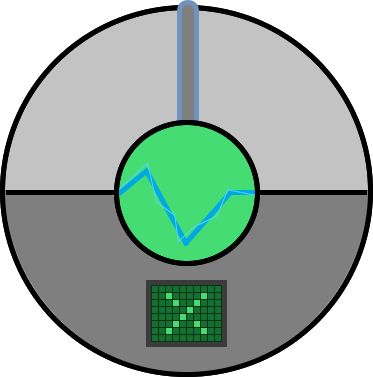voxtalkz is an open source python library that aims to provide a service to convert play-like-scripts to semi-relisic audio-dramas.
Python >= 3.6
pip
voxtalkz needs several python libraries to function:
Google Text To Speach (gTTS)
Pydub (pydub)
These will be atomatically installed with pip.
pip install voxtalkz
Note: if pip fails, pip3 should work
Write a short script and save it as test.script.
# Assign a name to an actor
Susan:british_woman
# Make her say Hello, World!
Susan:Hello, World!
-
Open the commandline and navigate to your file.
Run the script.
python3 -m voxtalkz test.script test --debug -
Run this in a python shell:
import voxtalks voxtalkz.say(<path/to/test.script>, <output_file_name>, debug=True)
Assuming all went well, you should see a file named test.mp3. Play it with your favorate mp3 playing program. (Other filetypes will be made avilable upon request)
instead of python3 -m voxtalkz test.script test --debug, use python3 -m voxtalkz test.script test --debug --cloud <my_api_key> (May not work)
Or in Idle or a script:
python import voxtalks voxtalkz.say(<path/to/test.script>, <output_file_name>, debug=True, cloudKey=<my_api_key>)
replace <my_api_key> with a Google Cloud TextToSpeach API key, (google Google Cloud TextToSpeach API key it to find out how to get one)
This will give you MUCH better sounding voices than the default default ones, but keep in mind, there are differant voices for wavenet. Look at the help section for more info.
Modifiers for wavenet voices are supported via ssml, with a simple conversion script such that:
Susan:real_american_woman
Susan: Hello World! __I really like dirt.__ *Dirt tasts good.*
Will sound like: Hello world! I really like dirt. Dirt tasts good.
Keep in mind, emphisising a word will break the flow of a sentance, such that the following
Susan:real_american_woman
Susan: I __really__ like dirt.
Will sound like I. Really. Like dirt.
Navigate to your home directory (On windows that's C:/Users/Username) and create a folder named .voxtalkz.
Navigate into that folder and create a new folder named soundEffects.
Download a .mp3 .wav, or .ogg sound effect (other filetypes will be made available upon request, or as I need them) and place it in the ~/.voxtalkz/soundEffects/ folder, for this tutorial we will assume the file is called footsteps.mp3. (~ means your home directory, on windows it's located at C:/Users/<yourusername>, and on linux it's at /home/<yourusername>)
Write a short script and save it as test2.script.
# Assign a name to an actor
Susan:british_woman
# Make her say Hello, World!
Susan:Hello, World!
Susan:Goodbye, World!
# Add the soud effect
*footsteps*
Open the commandline and navigate to your file. Run the script.
python3 -m voxtalkz test2.script test2 --debug
Play test2.mp3
Write a short script and save it as test3.script.
# Assign a name to an actor
Susan:british_woman
# Make her say Hello, World! as a little girl
Susan:Hello, World!@PITCH=0.3
# Make her say Goodbye, World! as an old woman
Susan:Goodbye, World!@PITCH=-0.3
Open the commandline and navigate to your file. Run the script.
python3 -m voxtalkz test3.script test3 --debug
Play the resulting test3.mp3.
import voxtalkz
TalkzBox = voxtalkz.voxTalkz('',<outputfilename>)
mylist = [['Susan','british_woman'],['Susan', 'Hello, world!']]
TalkzBox.ListToSound(mylist)Copy voxtalkz.py to the folder with the python file you want to use it with.
Add these line of code to your program:
import voxtalkz
TalkzBox = voxtalkz.voxTalkz(<scriptname>,<outputfilename>)
Parsed = TalkzBox.Parse(TalkzBox.file)
OutputSound = TalkzBox.ListToSound(Parsed)
# OutputSound is an instance of pydub.AudioSegment. It can be proccesed with pydub now.
OutputSound.export(filename, format='<.wav, .mp3, and others>')Any and all help will be greatly appriciated! Any feature requests will be implemented if possible.
- Don Flymoor - Initial work - DonFlymoor
This project is licensed under the GNUv3 License - see the LICENSE.md file for details
Usage: python3 -m voxtalkz [input file, output file]
Converts play-like script to a .mp3 file
Script file must be written in this manner:
#The first time a unknown name is called, instead of making the person talk, the name will be assigned to a person.
Susan:american_woman
#Then the person will "talk"
Susan:Hello, world!
#Comments are allowed!
*soundeffect_without_filename_extension
Effects can be applied by adding an @ symbal the the effect name, like so:
person1:hello, world!@VOLUME=8
A second effect can be applied by using the pipe("|") like so:
person1:Hello, World!@FADE|VOLUME=8
List of all effects:
@FADE | Fade to nothing
@FADE_IN | Fade in from silent
@OVERLAY | Overlays the sound onto what has already been recorded. Use @OVERLAY=VAR1 to START the overlay at the begining of where you assigned @VAR=1
@REPEAT= | Repeat audio segment however many times you specify. e.g. (american_woman:Hello, world!@REPEAT=10) would produce Someone saying "Hello, world!" ten times
@VAR= | Assign a number to a temporary table. Only used with @OVERLAY
@VOLUME= | Set volume change in decibels. A negitive number will reduce the volume
@PITCH= | Set pitch change. e.g. "american_woman:Hello, world!@PITCH=0.3" would make the person sound like a little girl, while "american_woman:Hello, world!@PITCH=-0.3" would sound like an old woman
Wavenet/Cloud voice specific effects:
@SPEAKINGRATE= | speed at which the person talks, a number from 0.25 to 4.0, where 1 is normal, 2 is twice as fast, 0.5 if half speed...
List of all normal actors:
indian_man | Clearly speaks
american_woman | Clearly speaks
scottish_woman
russian_woman
drawling_man
danish_woman | Clearly speaks
dutch_woman
au_woman | Clearly speaks
british_woman | Clearly speaks
indian_woman | Clearly speaks
spanish_woman
french_woman
hindu_woman
alien_man
italian_man
phone_woman
korean_man | Clearly speaks
dramatized_woman
silly_man
robot_man
dramitized_girl
bored_teen
happy_girl
boss_lady
young_grandma
spoiled_girl
american_woman
List of all wavenet actors:
"real_australian_woman":["en-AU-Wavenet-A","en-AU"],
"real_australian_man":["en-AU-Wavenet-B","en-AU"],
"real_personal_australian_woman":["en-AU-Wavenet-C","en-AU"],
"real_personal_australian_man":["en-AU-Wavenet-D","en-AU"],
"real_indian_woman":["en-IN-Wavenet-A","en-IN"],
"real_indian_man":["en-IN-Wavenet-B","en-IN"],
"real_personal_indian_woman":["en-IN-Wavenet-C","en-IN"],
"real_personal_indian_man":["en-IN-Wavenet-D","en-IN"],
"real_british_woman":["en-GB-Wavenet-A","en-GB"],
"real_british_man":["en-GB-Wavenet-B","en-GB"],
"real_personal_british_woman":["en-GB-Wavenet-C","en-GB"],
"real_urgent_british_woman":["en-GB-Wavenet-F","en-GB"],
"real_personal_british_man":["en-GB-Wavenet-D","en-GB"],
"real_young_american_man":["en-US-Wavenet-A","en-US"],
"real_middleage_american_man":["en-US-Wavenet-B","en-US"],
"real_american_man":["en-US-Wavenet-B","en-US"],
"real_middleage_american_woman":["en-US-Wavenet-C","en-US"],
"real_american_woman":["en-US-Wavenet-C","en-US"],
"real_middleage_personal_american_man":["en-US-Wavenet-D","en-US"],
"real_middleage_personal_american_woman":["en-US-Wavenet-E","en-US"],
"real_young_personal_american_woman":["en-US-Wavenet-F","en-US"],
"real_distracted_middleage_american_woman":["en-US-Wavenet-G","en-US"],
"real_young_american_woman":["en-US-Wavenet-H","en-US"],
"real_young_personal_american_man":["en-US-Wavenet-I","en-US"],
"real_cocky_american_man":["en-US-Wavenet-J","en-US"]
+ all normal actors
Sound effects must be in the .mp3 or .wav format and placed in /home/user/.voxtalk/soundEffects
To use footsteps.mp3 as a sound effect: put '*footsteps' in your script
